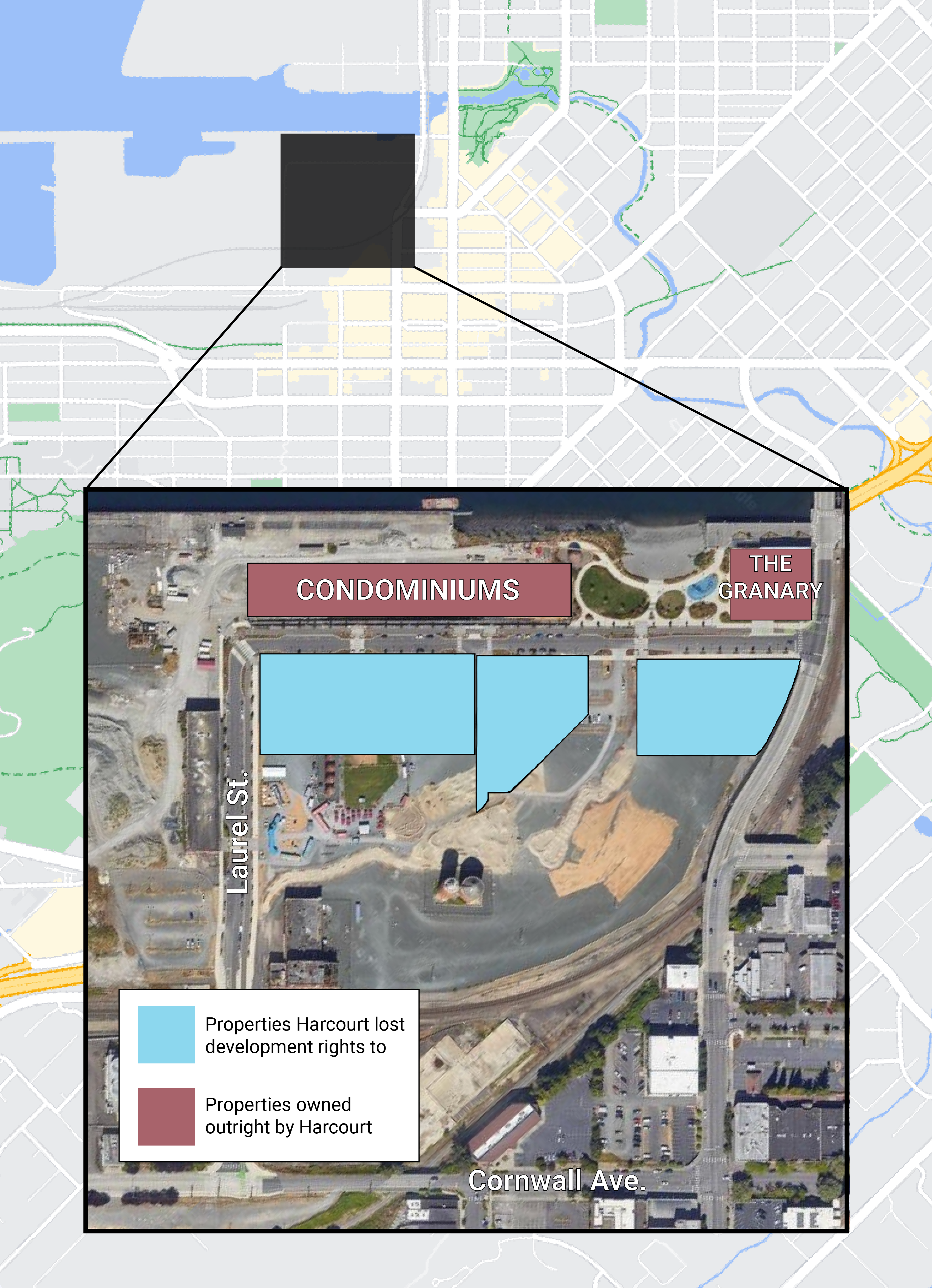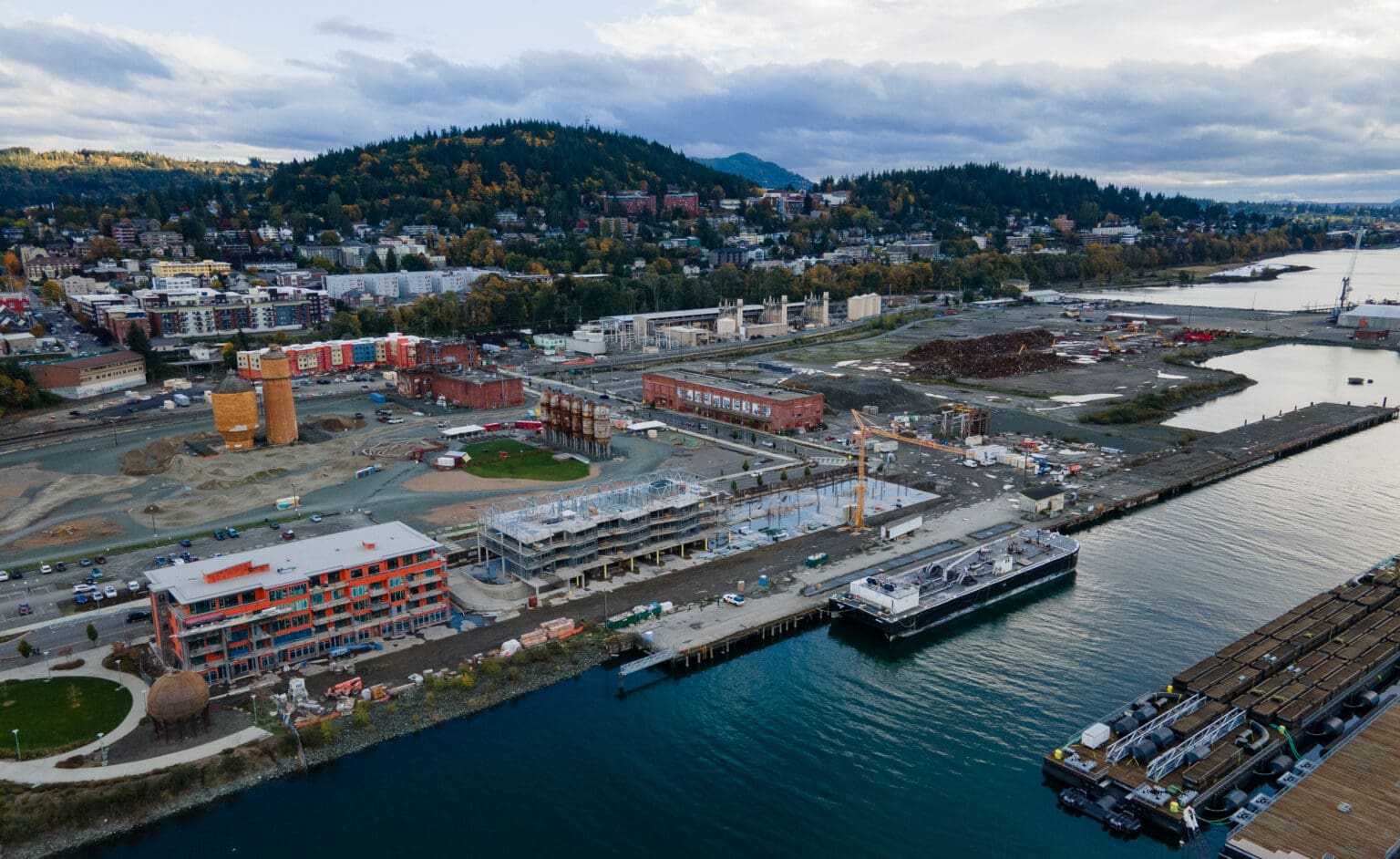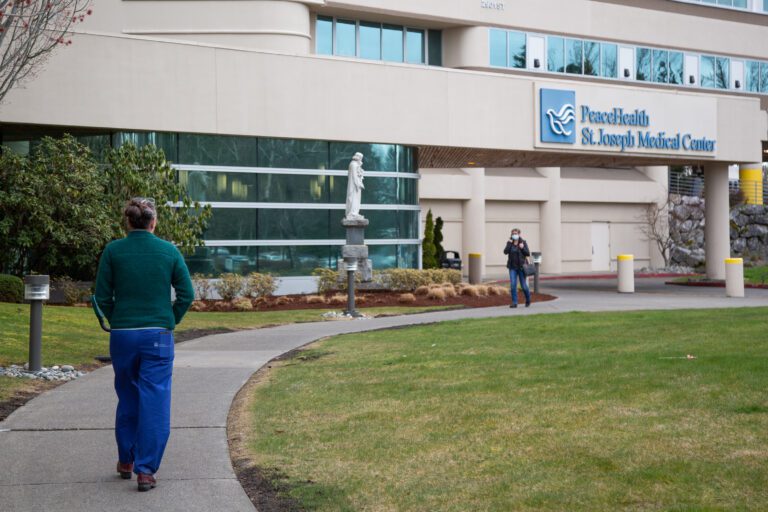The Port of Bellingham has filed a lawsuit against Harcourt Developments, the Ireland-based company that was originally teed up to be the major player in reshaping Bellingham’s waterfront.
Harcourt initially secured the Master Development Agreement in 2015 with the port, gaining exclusive rights to develop 18.8 acres of land on the northeast end of the former Georgia-Pacific mill site.
But repeated failures to meet contractual obligations and environmental violations claimed by the port, saw the developer’s piece of the waterfront whittled down over the years.
The company defaulted on its development contract, according to port officials, who also denied the developer any further extensions in a letter sent in February.
“A controversy exists between the Port and Harcourt as to whether (i) Harcourt is in default under the Restated MDA; and (ii) Harcourt’s default excuses the Port’s performance under the Restated MDA, including, without limitation, the Port’s denial of Harcourt’s request for Master Development Schedule extension,” the lawsuit states.
The port is seeking declaratory judgment, attorney’s fees and “further relief as the court deems just and equitable,” in the suit filed March 1 with Whatcom County Superior Court.
A declaratory judgment would be binding and would put the port on firmer legal ground, in case Harcourt filed a lawsuit of its own.
“The port denied Harcourt’s extension request,” port Public Affairs Administrator Mike Hogan said Friday, March 15 in an email. “The port is currently seeking a ruling from Whatcom County Superior Court as to the reasonableness of the port’s denial of that request, in light of Harcourt’s default.”
Harcourt officials could not be immediately reached for comment. The company has 20 days to respond to avoid a default judgment.
By 2021, Harcourt had already missed benchmarks for construction of two condominiums.
The development agreement was rewritten, giving Harcourt until Oct. 19, 2023, to complete the two condominium buildings southwest of Waypoint Park. The port gave the extension in recognition that COVID-19 disruptions had likely hampered progress on the buildings.
Nonetheless, the port reduced Harcourt’s development rights on the sprawling former mill site down to 7.7 acres, which included its Granary and condominium properties.
“Harcourt was notified of eight individual contractual defaults, including failure to complete the first two residential buildings within the contract’s timeline,” Commissioner Michael Shepard announced in a Oct. 31 Facebook post.
In December, the company sent a letter to the port asking for an additional extension, saying the delays were caused by delays by the City of Bellingham and others in providing “infrastructure materially necessary for Harcourt to complete a Project.”
In a detailed response, the port rebuked the statements made in Harcourt’s letter and denied the extension. The port noted that it had previously explained to the company that while Harcourt was in its Notice of Default, the port would not agree to any program updates.
The port’s lawsuit doesn’t interfere with Harcourt’s efforts to complete construction of three condominium buildings on Whatcom Waterway, on property Harcourt owns. The dispute also is unrelated to a planned redevelopment of the historic Boardmill building, which is currently in design review with the City of Bellingham.
Nor will the dispute affect operations at the bicycle pump track and the container village. Harcourt has no development claims to that area.
The Irish company perhaps best known for its Titanic museum in Belfast was developing a vision for 3.7 acres of prime waterfront property next to Trackside beer garden and a bicycle pump track: four six-story buildings with shops and apartments. Another 1.6 acres near Harcourt’s Granary Building also awaited the company’s proposal.
Harcourt’s hiring as a private lead developer of a former industrial site considered key to the growth and economic success of Bellingham’s downtown core has long been controversial among city leaders and residents who participated in multiple detailed planning processes for the waterfront property.
The site 20 years ago was envisioned as a new city centerpiece, with a mix of open space, residences, waterfront industry and even an extension facility of Western Washington University, which dropped out of negotiations for the project in 2022.

Reporter Ralph Schwartz contributed to this report.
This story was updated at 1:10 p.m. March 15 with a statement from port Public Affairs Administrator Mike Hogan and more context about waterfront developments that are not affected by the port’s lawsuit.
Isaac Stone Simonelli is CDN’s enterprise/investigations reporter; reach him at isaacsimonelli@cascadiadaily.com; 360-922-3090 ext. 127.




